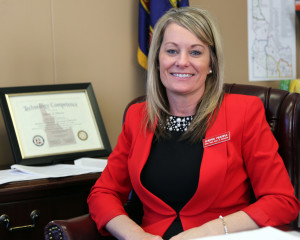A rewritten literacy bill is gaining momentum during a crucial stage of the legislative session.
On Tuesday, the House Education Committee voted unanimously to advance House Bill 526, to provide intensive supplemental literacy instruction for kindergarten through third-grade students who are reading below grade level.
House Bill 526 replaces an earlier proposal that the committee shelved this month.
Like its predecessor, the new bill would provide a minimum of 60 hours or supplemental instruction for students who score at the lowest of three levels on the Idaho Reading Indicator tests. For kindergartners scoring at the lowest levels on the test, optional all-day kindergarten would be available.
For students who score at the middle level — which is still below grade level — at least 30 hours of supplemental reading and literacy instruction would be available.
Under the bill, any supplemental reading instruction would be “proven effective (and) research-based” intervention in phonetic awareness, vocabulary, comprehension and fluency.
At the local district’s discretion, supplemental instruction could include before-school, after-school or summer reading programs.

The new bill builds upon its predecessor by establishing benchmarks and timelines for improving student literacy scores.
Superintendent of Public Instruction Sherri Ybarra was one of several people who testified in support of the bill.
“Closing the reading gap before third grade is so critical, and I think this bill really does attempt to do that,” Ybarra said. “The most important piece is not the money, it is the strategies we put in there.”
According to State Board of Education research, an average of 36,926 K-3 students were reading below grade level over the past three years. The bill would provide $290 per student — if the plan is funded at the $10.7 million level recommended by Gov. Butch Otter. Ybarra called for a $5 million line item, but has said she would gladly accept the $10.7 million.
The Idaho Rural Schools Association, Idaho Association of School Administrators, Idaho Education Association, Idaho Business for Education and Idaho Schools Boards Association also back the new bill.
The proposal is in Otter’s Task Force for Improving Education — and its 2013 recommendations, refined over two years by a literacy subcommittee.

Rep. Patrick McDonald led the effort to pass the bill in committee.
“It’s one thing to appropriate money, but it’s another to consider a bill that not only supports that appropriation, but also tells you what you have to do to increase the students’ ability to read,” McDonald said in an interview after the hearing.
McDonald said the new bill is “way better” than its predecessor and should provide a foundation to help students throughout their academic careers.
The timing of Tuesday’s committee vote was important because the budget-setting Joint Finance-Appropriations Committee is scheduled to meet Monday to set the public school budget. Generally, JFAC will not fund new proposals unless they have passed at least the House or Senate.
The bill next heads to the House floor, where House Education Vice Chairwoman Julie VanOrden, R-Pingree, will sponsor it. Depending on the House’s workload, the bill could reach the floor as early as Wednesday or Thursday.
A companion literacy bill, House Bill 451, was placed on hold on the House floor until Wednesday so lawmakers could consider the two plans concurrently.
In other Statehouse news from Tuesday:

STEM Education Fund. The Senate approved a piece of Idaho’s STEM education legislative plan — creating a long-term endowment to support initiatives in science, technology, engineering and math.
It’s unclear how much the state will put into its STEM Education Fund — Otter has requested a $10 million endowment, but it’s up to legislative budget-writers to decide how much to set aside. The fund would be used to match private donations and support STEM programs, such as a proposed computer science initiative.
The endowment is crucial to demonstrate the state’s commitment to STEM, and attract matching private sector donations, said the bill’s sponsor, Sen. Bob Nonini.
Senate Bill 1279 passed the Senate on a 34-1 vote, with Moscow Democrat Dan Schmidt casting the lone dissenting vote. The bill now goes to the House.

Trustee recall bill scrapped. Sen. Chuck Winder has dropped a bill written in the wake of the West Ada School District recall elections.
Winder’s Senate Bill 1273 would have tried to tighten the process of filling school board vacancies — in an attempt to prevent recalled trustees from stacking boards with like-minded replacements.
Winder told Meridian Press that he is dropping the bill for 2016, but plans to bring it back in 2017.
Leadership premiums. The Senate approved a bill to boost leadership premiums for some school employees.
The premiums are designed to reward employees for mentoring, taking on hard-to-fill positions or taking on other leadership roles. Senate Bill 1266 would allow instructional and pupil service staff employees to earn premiums of up to $900, up from $850.
Pupil service staff includes counselors, nurses and occupational and physical therapists, among other employees.
The increase carries a price tag of slightly under $1 million.
No senators debated for or against the bill, which passed on a 26-8 vote. The bill now goes to the House.
Sick leave. The Senate Education Committee endorsed a bill which would allow educational staff to take their accrued sick leave from job to job.
The State Board of Education says the bill is designed to encourage employees to move from job to job, while saying in education-related fields.
House Bill 452 heads to the Senate floor. If it passes there, it goes to Otter’s desk.
Idaho Education News reporter Kevin Richert contributed to this report.
